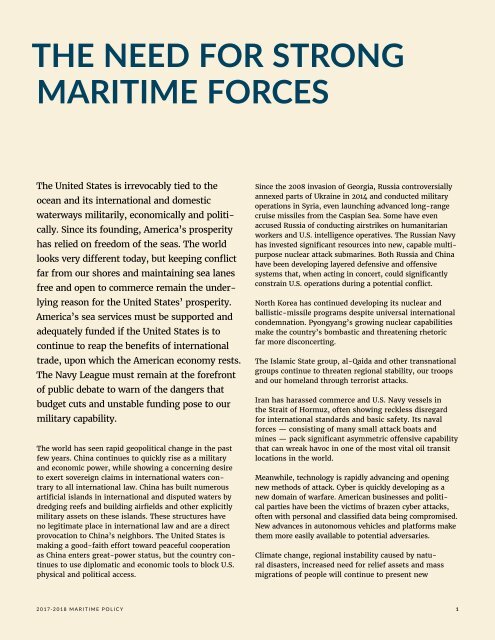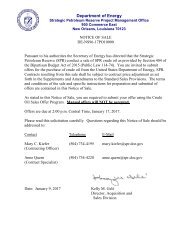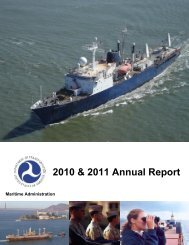You also want an ePaper? Increase the reach of your titles
YUMPU automatically turns print PDFs into web optimized ePapers that Google loves.
THE NEED <strong>FOR</strong> <strong>STRONG</strong><br />
<strong>MARITIME</strong> <strong>FOR</strong>CES<br />
The United States is irrevocably tied to the<br />
ocean and its international and domestic<br />
waterways militarily, economically and politically.<br />
Since its founding, America’s prosperity<br />
has relied on freedom of the seas. The world<br />
looks very different today, but keeping conflict<br />
far from our shores and maintaining sea lanes<br />
free and open to commerce remain the underlying<br />
reason for the United States’ prosperity.<br />
America’s sea services must be supported and<br />
adequately funded if the United States is to<br />
continue to reap the benefits of international<br />
trade, upon which the American economy rests.<br />
The Navy League must remain at the forefront<br />
of public debate to warn of the dangers that<br />
budget cuts and unstable funding pose to our<br />
military capability.<br />
The world has seen rapid geopolitical change in the past<br />
few years. China continues to quickly rise as a military<br />
and economic power, while showing a concerning desire<br />
to exert sovereign claims in international waters contrary<br />
to all international law. China has built numerous<br />
artificial islands in international and disputed waters by<br />
dredging reefs and building airfields and other explicitly<br />
military assets on these islands. These structures have<br />
no legitimate place in international law and are a direct<br />
provocation to China’s neighbors. The United States is<br />
making a good-faith effort toward peaceful cooperation<br />
as China enters great-power status, but the country continues<br />
to use diplomatic and economic tools to block U.S.<br />
physical and political access.<br />
Since the 2008 invasion of Georgia, Russia controversially<br />
annexed parts of Ukraine in 2014 and conducted military<br />
operations in Syria, even launching advanced long-range<br />
cruise missiles from the Caspian Sea. Some have even<br />
accused Russia of conducting airstrikes on humanitarian<br />
workers and U.S. intelligence operatives. The Russian Navy<br />
has invested significant resources into new, capable multipurpose<br />
nuclear attack submarines. Both Russia and China<br />
have been developing layered defensive and offensive<br />
systems that, when acting in concert, could significantly<br />
constrain U.S. operations during a potential conflict.<br />
North Korea has continued developing its nuclear and<br />
ballistic-missile programs despite universal international<br />
condemnation. Pyongyang’s growing nuclear capabilities<br />
make the country’s bombastic and threatening rhetoric<br />
far more disconcerting.<br />
The Islamic State group, al-Qaida and other transnational<br />
groups continue to threaten regional stability, our troops<br />
and our homeland through terrorist attacks.<br />
Iran has harassed commerce and U.S. Navy vessels in<br />
the Strait of Hormuz, often showing reckless disregard<br />
for international standards and basic safety. Its naval<br />
forces — consisting of many small attack boats and<br />
mines — pack significant asymmetric offensive capability<br />
that can wreak havoc in one of the most vital oil transit<br />
locations in the world.<br />
Meanwhile, technology is rapidly advancing and opening<br />
new methods of attack. Cyber is quickly developing as a<br />
new domain of warfare. American businesses and political<br />
parties have been the victims of brazen cyber attacks,<br />
often with personal and classified data being compromised.<br />
New advances in autonomous vehicles and platforms make<br />
them more easily available to potential adversaries.<br />
Climate change, regional instability caused by natural<br />
disasters, increased need for relief assets and mass<br />
migrations of people will continue to present new<br />
2017-2018 <strong>MARITIME</strong> POLICY 1




